
10 Best Social-Emotional Learning Games for Kids
Social-emotional learning (SEL) games help kids develop essential skills like understanding emotions, building relationships, and making good decisions. These interactive games make learning fun through play, encouraging cooperation, communication, and problem-solving.
Here are the top 10 SEL games for kids:
- Hedbanz - Guessing game that promotes perspective-taking and teamwork (Ages 7+)
- A Penny for Your Thoughts - Thought-provoking conversation cards about emotions and coping (Ages 5+)
- Q's Race to The Top - Combines physical activity with social-emotional discussions (Ages 6+)
- PeaceMakers - Mindfulness game focused on self-awareness and relationships (Ages 5+)
- Qwirkle - Pattern-building game that encourages logical thinking and flexibility (Ages 6+)
- Listmania - Cooperative game where players create lists together, fostering teamwork (Ages 6+)
- Cauldron Quest - Engaging storyline game that promotes cooperation (Ages 5+)
- Story Cubes - Storytelling game that fosters creativity and self-expression (Ages 6+)
- Apples to Apples Junior - Perspective-taking game where players match cards (Ages 9+)
- Bubble Talk - Visual game matching captions to images, encouraging communication (Ages 8+)
| Tips for Using SEL Games |
|---|
| - Create a safe, welcoming space |
| - Adjust games for different ages and abilities |
| - Encourage reflection and discussion |
| - Integrate games into existing activities and routines |
SEL games provide an engaging way to teach kids valuable social and emotional skills through play. By choosing age-appropriate, educational, and fun games, we can help children develop the tools they need to succeed in school and life.
Related video from YouTube
Why Games Help with SEL
Games make learning social-emotional skills fun and engaging for kids. Through play, children can:
- Experience different social situations
- Practice managing emotions
- Build empathy by seeing different viewpoints
- Develop communication, teamwork, and problem-solving abilities
- Learn positive ways to handle challenges
Games turn abstract ideas into hands-on experiences, helping kids understand and apply the lessons. The interactive nature encourages active participation, reinforcing the skills through practice.
Some key SEL skills that games can develop include:
Self-Awareness and Self-Management
| Skill | Description |
|---|---|
| Identifying and expressing emotions | Understanding and communicating feelings |
| Recognizing strengths and limitations | Knowing personal abilities and areas for growth |
| Developing self-control and resilience | Managing emotions and persevering through challenges |
| Setting and achieving goals | Defining and working towards objectives |
Social Awareness and Relationship Skills
| Skill | Description |
|---|---|
| Understanding diverse perspectives | Appreciating different viewpoints and cultures |
| Practicing active listening and communication | Engaging in effective dialogue and expression |
| Cooperating and collaborating | Working together towards a common goal |
| Resolving conflicts constructively | Finding positive solutions to disagreements |
Responsible Decision-Making
| Skill | Description |
|---|---|
| Considering ethical choices | Making decisions based on moral principles |
| Analyzing situations from multiple angles | Examining different aspects of a scenario |
| Evaluating consequences of actions | Understanding the potential outcomes of decisions |
| Developing problem-solving strategies | Finding effective ways to address challenges |
Choosing the Right SEL Games
Age-Appropriate Games
Picking games that match a child's age is key for effective social-emotional learning. Games should fit the child's development stage and thinking abilities. For younger kids, simpler games with clear rules and visuals work best. Older children can handle more complex gameplay and ideas. Consider the reading level, attention span, and interests of different ages to keep games engaging and impactful.
Educational Value
The main goal of SEL games is to teach social-emotional skills like:
- Understanding and managing emotions
- Setting positive goals
- Showing empathy
- Building healthy relationships
- Making good decisions
Look for games that reinforce these core skills through their gameplay, scenarios, and objectives. Games that allow for reflection, discussion, and applying SEL principles are more educationally valuable.
Fun and Engaging
While educational value matters, games must also be enjoyable to keep kids interested and participating actively. Look for interactive elements, appealing visuals, and an appropriate challenge level. Games with humor, storytelling, or role-playing can make learning more immersive and memorable.
Versatile Games
Versatile games can be used in various settings like classrooms, homes, or therapy sessions. Games that can accommodate different group sizes, facilitate discussions, and offer varying difficulty levels are more versatile. Additionally, games that can be played repeatedly without losing their appeal or educational value are ideal for reinforcing SEL skills over time.
Affordable and Available
Cost and accessibility are important factors when selecting SEL games. While some high-quality games may be more expensive, there are also many affordable or free options. Consider how easily the games can be purchased or downloaded, and whether they require additional materials or resources.
Top 10 SEL Games for Kids
Game 1: Hedbanz

Hedbanz is a guessing game where players wear headbands with cards showing objects, animals, or characters. Players ask yes/no questions to teammates to figure out what's on their headband. This game helps kids practice:
- Seeing from different viewpoints
- Clear communication
- Teamwork
Suitable for ages 7 and up.
| Pros | Cons |
|---|---|
| Encourages teamwork | May need adult guidance for younger kids |
| Improves communication | Small parts can get lost easily |
Game 2: A Penny for Your Thoughts

In A Penny for Your Thoughts, players draw cards with thought-provoking questions about emotions and challenges. This leads to discussions on social-emotional strengths and healthy coping strategies. Ideal for ages 5 and up.
| Pros | Cons |
|---|---|
| Facilitates deep conversations | May require guidance to stay focused |
| Suitable for families and groups | Can become repetitive after multiple plays |
Game 3: Q's Race to The Top
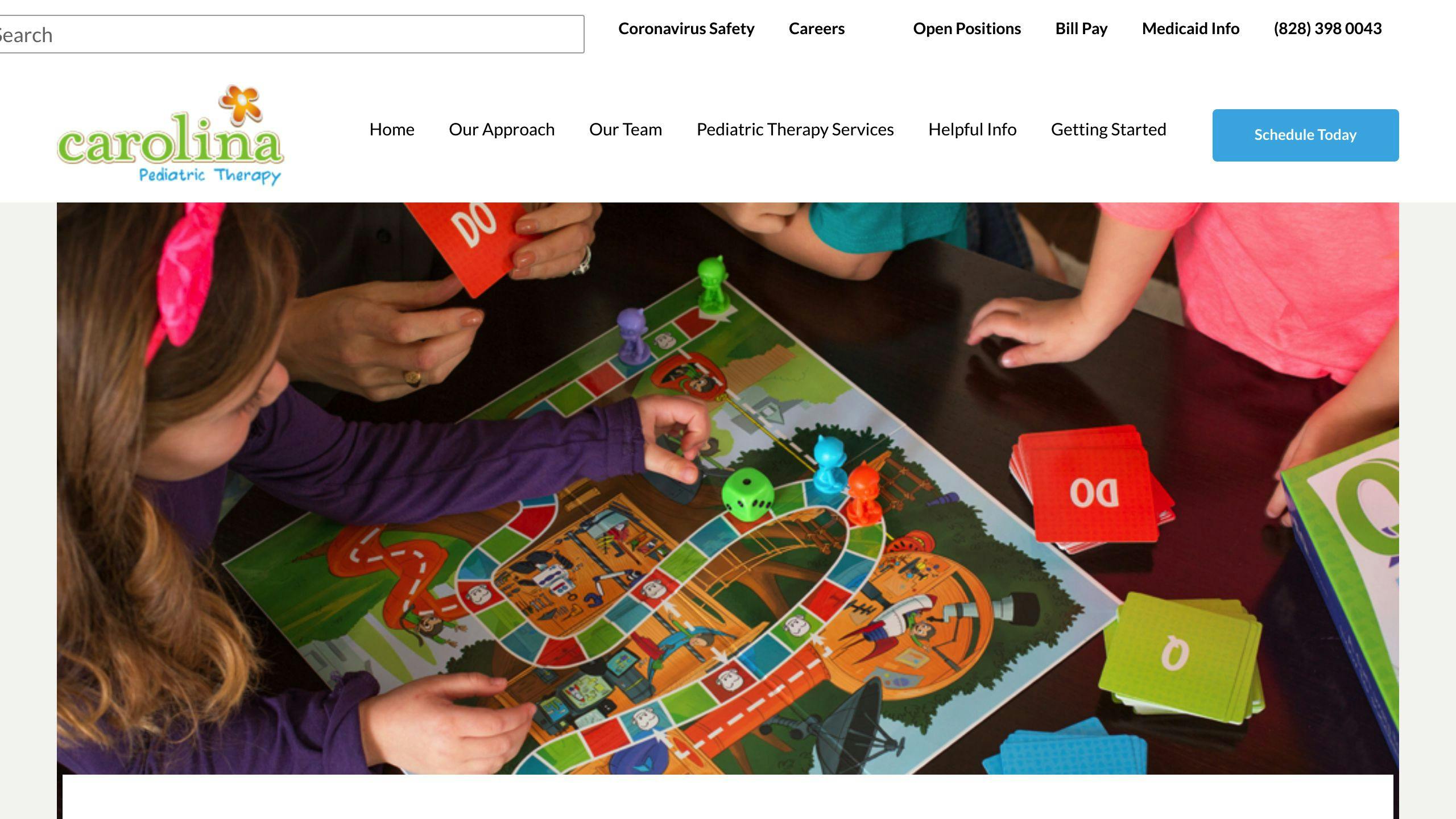
Q's Race to The Top combines conversation starters with physical activities. Players move around and complete challenges while discussing social-emotional topics. This game keeps active kids engaged. Suitable for ages 6 and up.
| Pros | Cons |
|---|---|
| Interactive and engaging | Requires space for movement |
| Encourages physical activity | Can be chaotic with larger groups |
Game 4: PeaceMakers
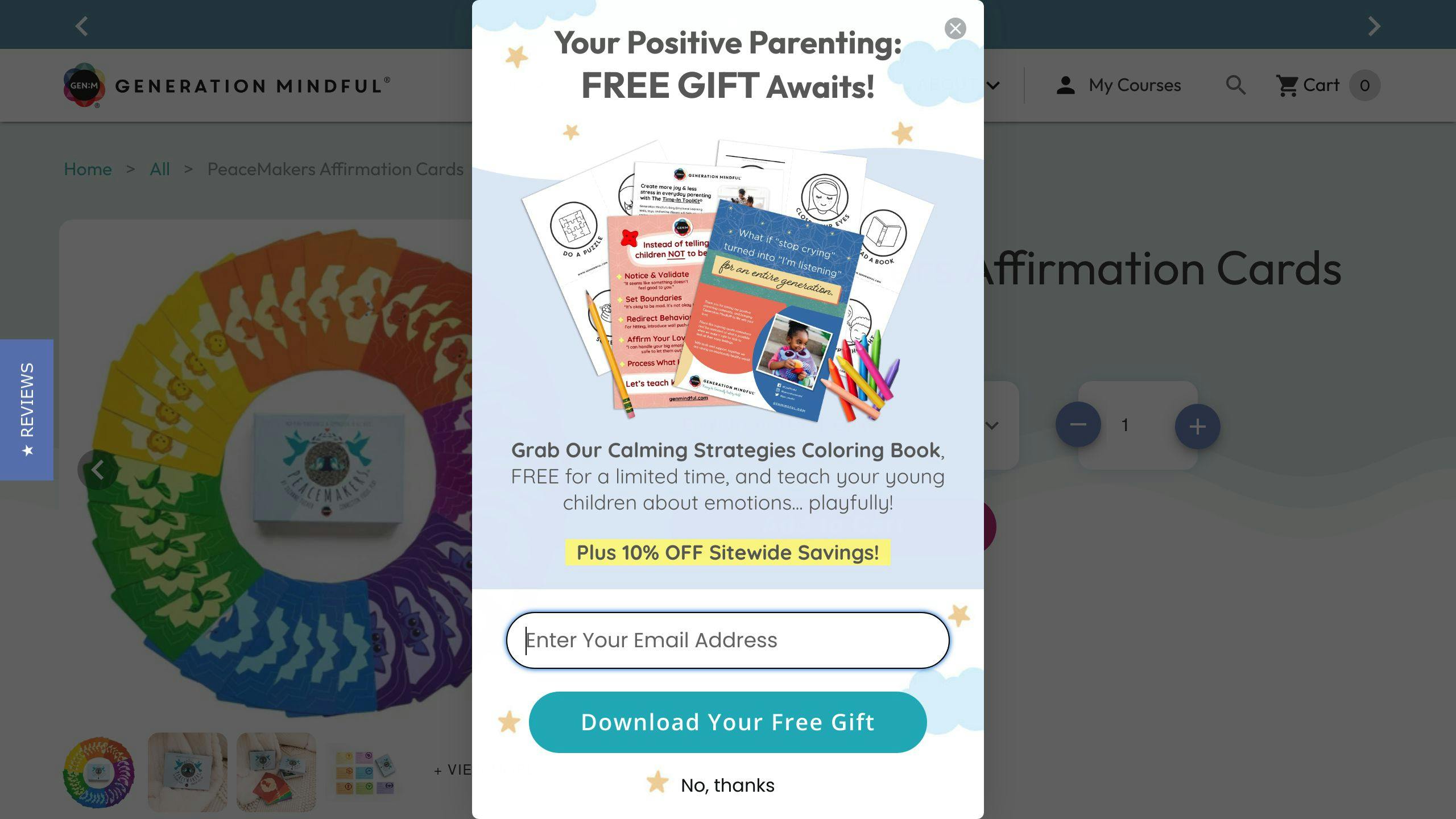
PeaceMakers focuses on mindfulness and self-awareness. Players draw cards with prompts that lead to insightful conversations about emotions, relationships, and personal growth. Suitable for ages 5 and up.
| Pros | Cons |
|---|---|
| Promotes mindfulness | May be challenging for very young children |
| Easy to facilitate | Requires children to be in the right mindset |
Game 5: Qwirkle
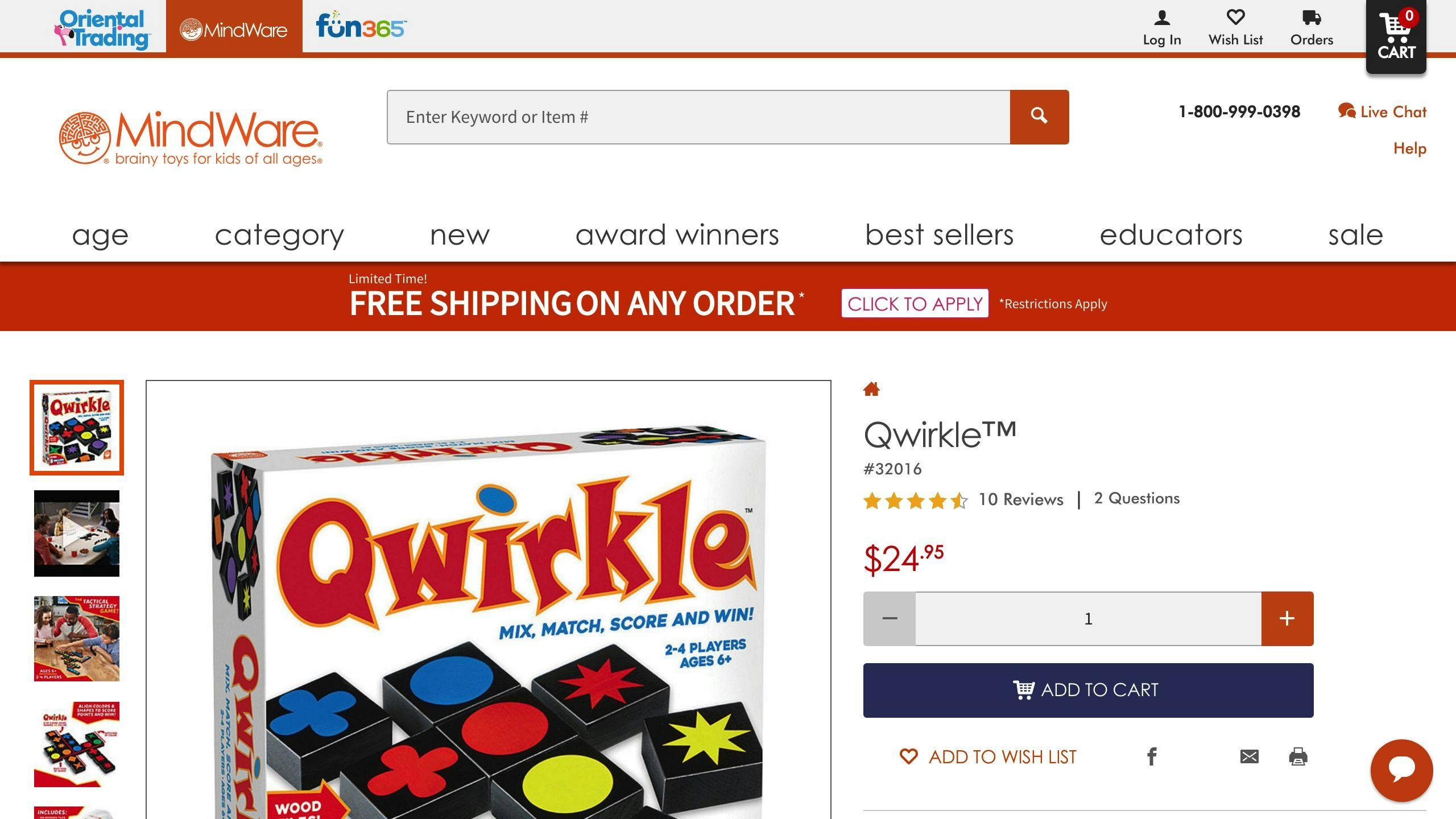
In Qwirkle, players create patterns with colorful shapes. They must use strategic thinking and flexible problem-solving skills to score points. While not directly focused on SEL skills, Qwirkle encourages logical thinking and cognitive flexibility. Suitable for ages 6 and up.
| Pros | Cons |
|---|---|
| Encourages logical thinking | Can be competitive |
| Easy setup | Requires understanding of rules |
Game 6: Listmania
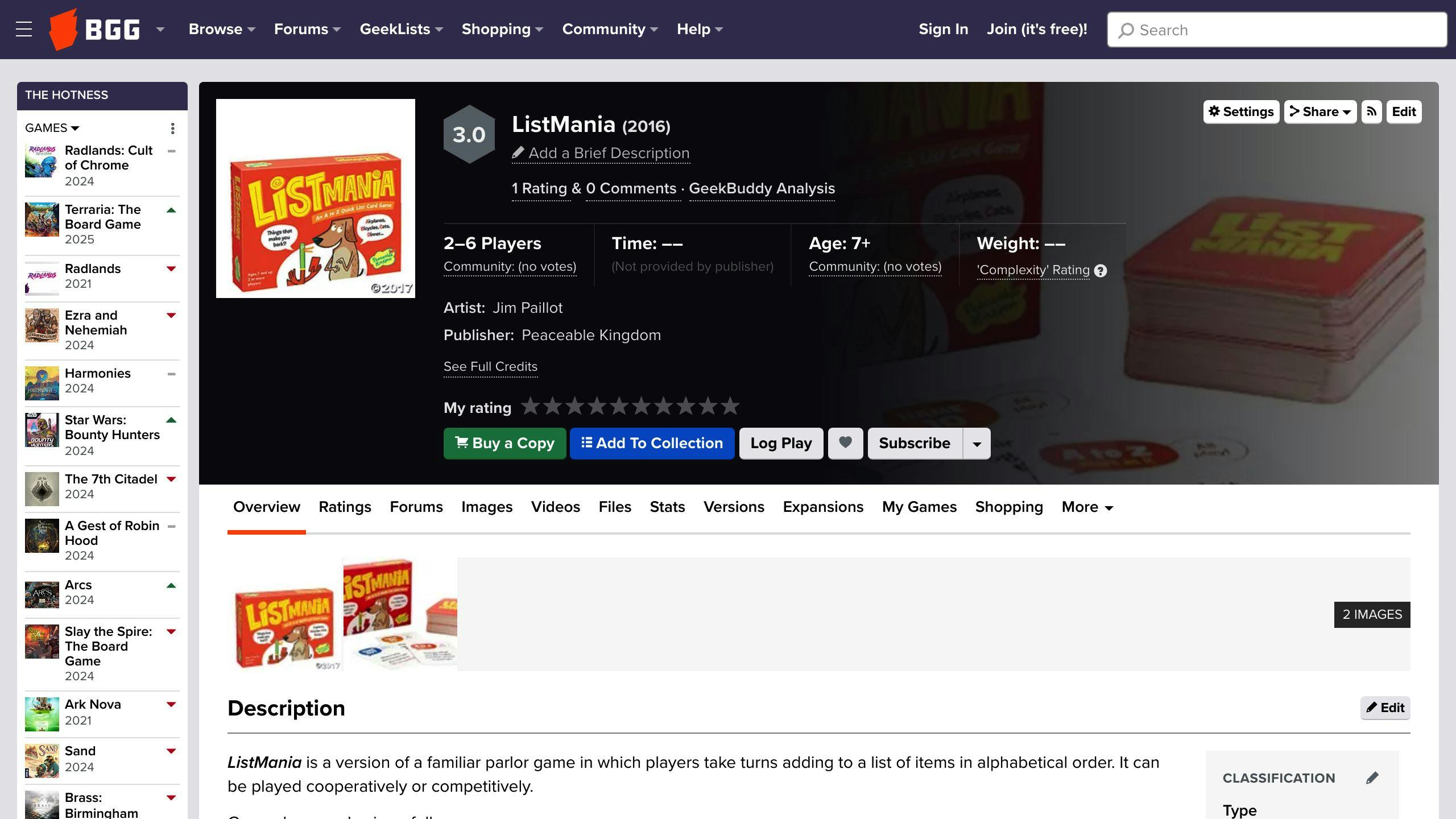
Listmania is a cooperative game with fun, thought-provoking questions that encourage teamwork and communication. Players work together to create lists based on the prompts, fostering social-emotional skills. Easy to learn and play anywhere. Suitable for ages 6 and up.
| Pros | Cons |
|---|---|
| Encourages teamwork | Limited game variety |
| Easy to transport | May become repetitive |
Game 7: Cauldron Quest
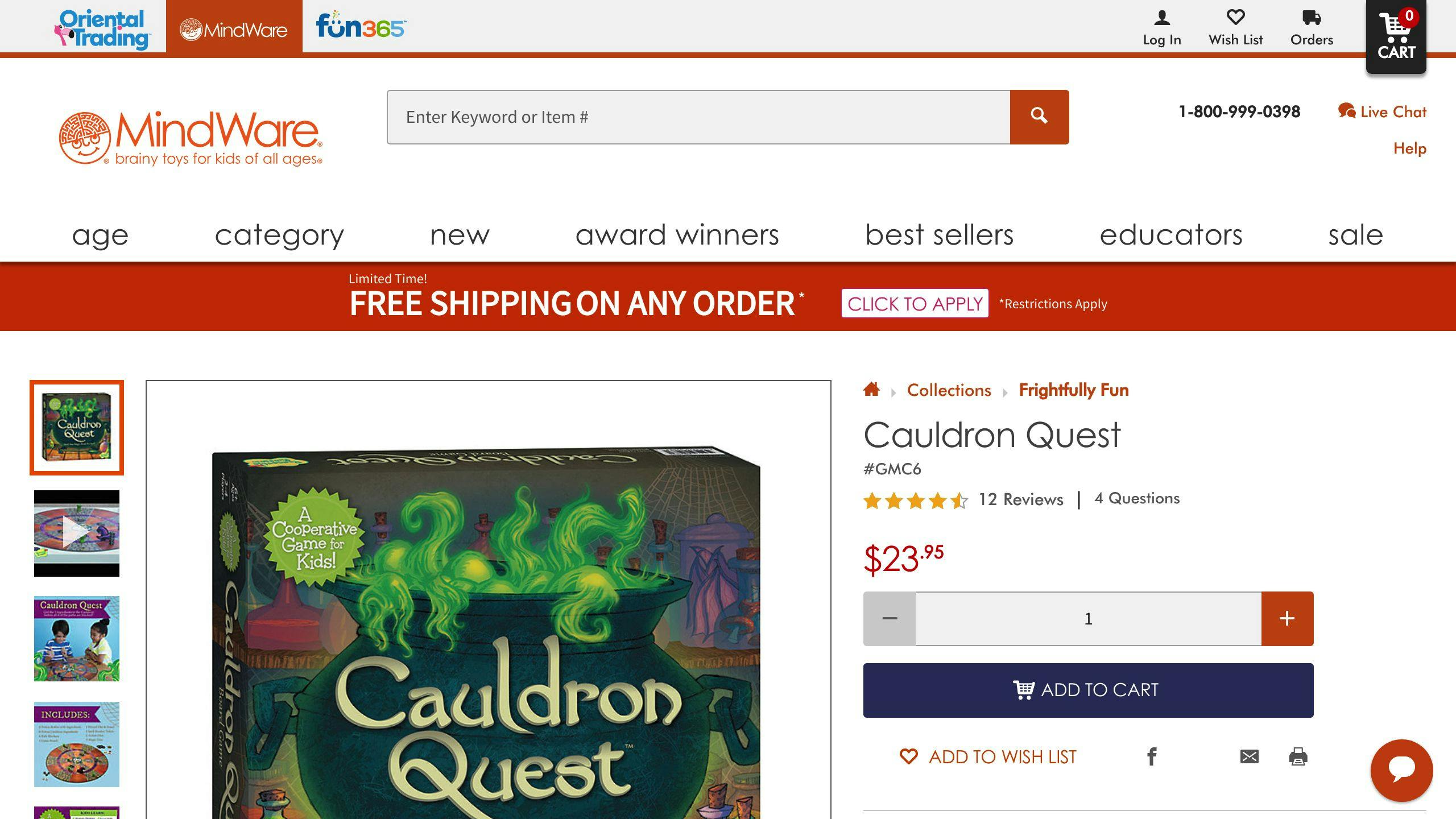
In Cauldron Quest, players work together to collect ingredients before getting caught by spells. Simple rules and an engaging storyline make it suitable for groups. This game promotes cooperation and communication skills. Suitable for ages 5 and up.
| Pros | Cons |
|---|---|
| Promotes cooperation | May be too simple for older kids |
| Engaging storyline | Requires multiple players |
Game 8: Story Cubes
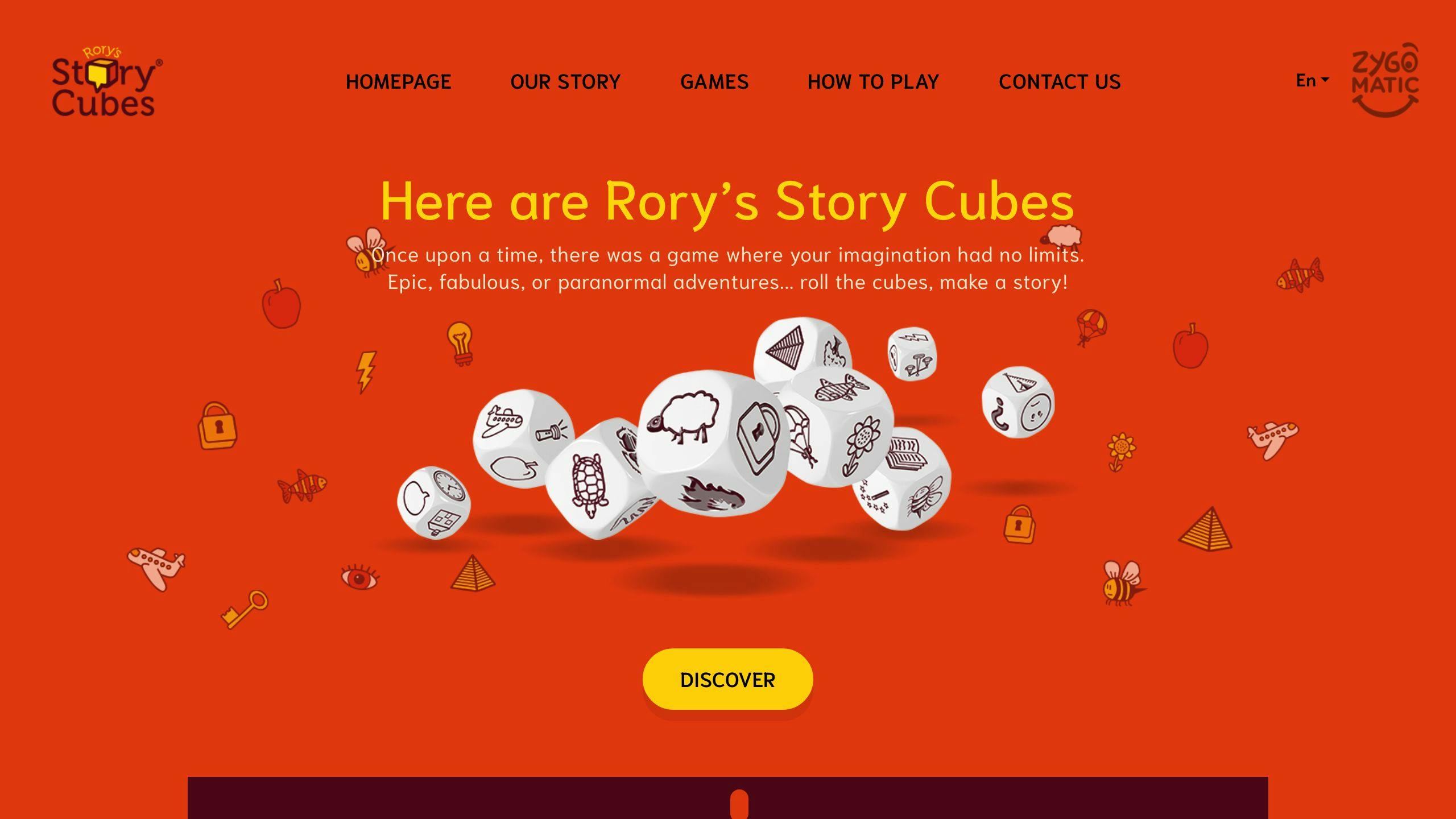
Story Cubes is a game that encourages flexible thinking and collaborative storytelling. Players roll the cubes and use the images to construct a unique story, fostering imagination and self-expression. Ideal for small groups. Suitable for ages 6 and up.
| Pros | Cons |
|---|---|
| Fosters creativity | Can be overwhelming for shy children |
| Flexible gameplay | Requires imaginative input |
Game 9: Apples to Apples Junior
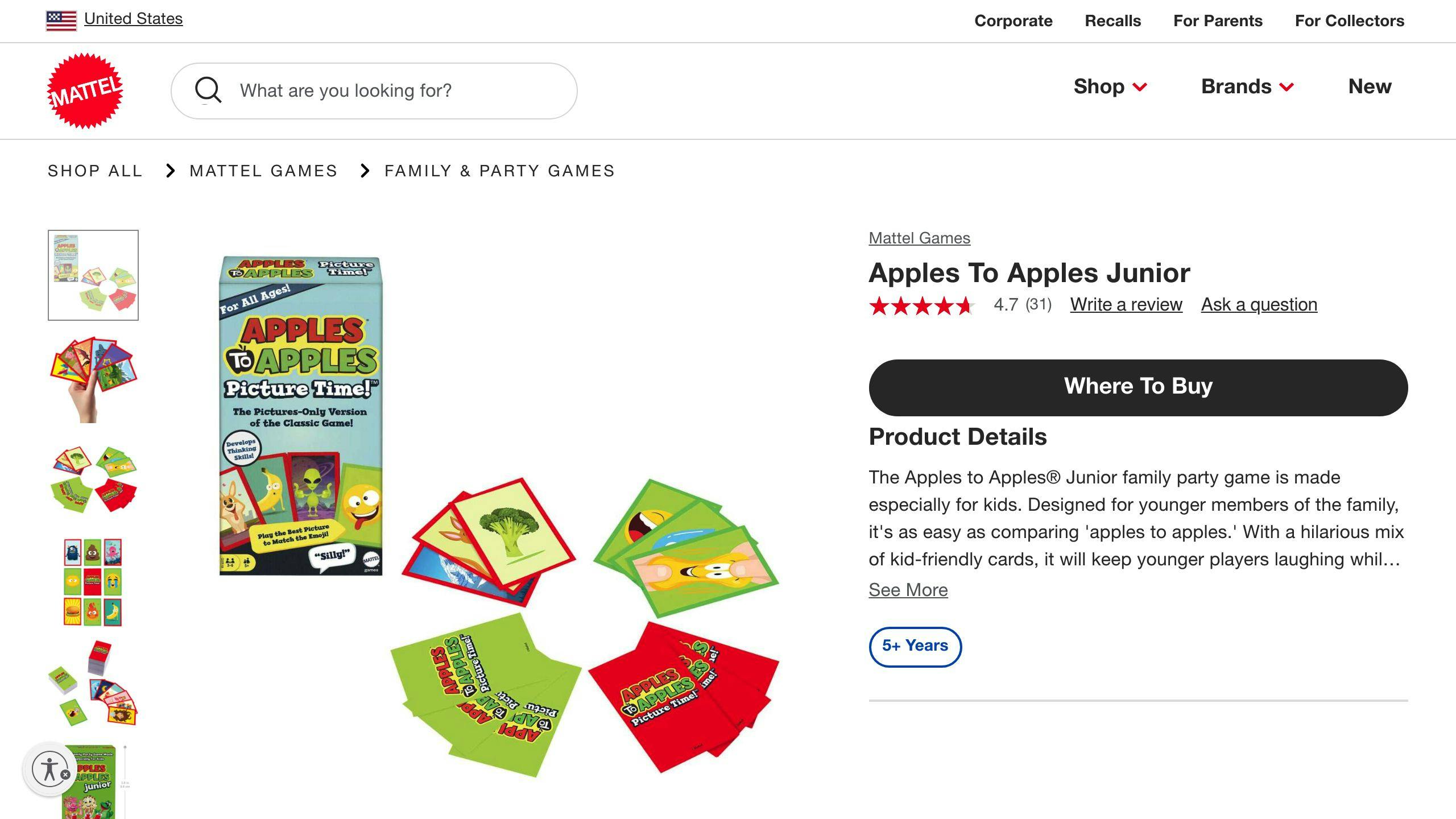
In Apples to Apples Junior, players must match the best card from their hand to the judge's prompt. This encourages seeing from different viewpoints as the winning card depends on the judge's interpretation. Suitable for ages 9 and up.
| Pros | Cons |
|---|---|
| Encourages perspective-taking | Requires understanding of humor and context |
| Fun for groups | Competitive nature |
Game 10: Bubble Talk
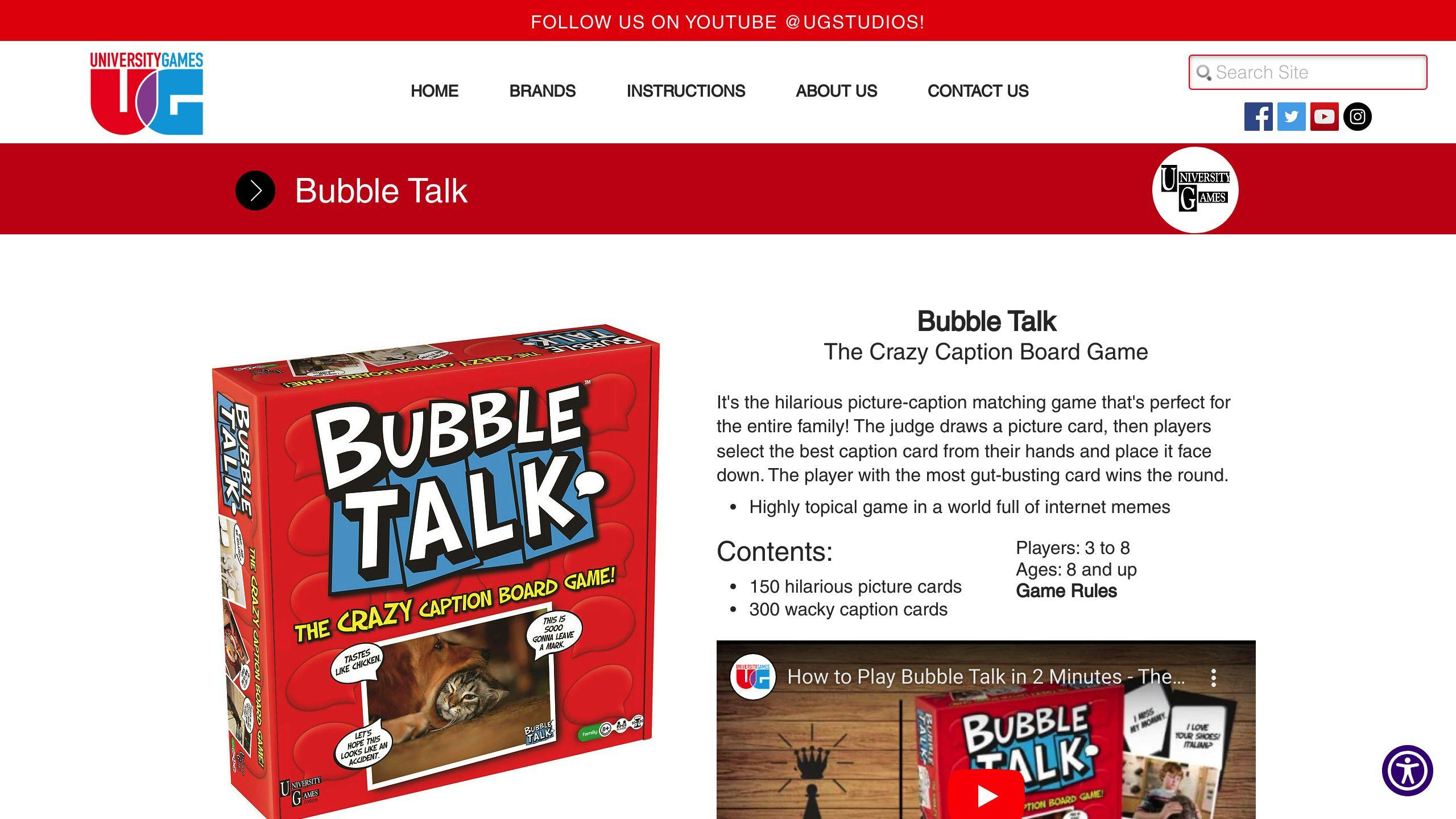
Bubble Talk is similar to Apples to Apples, but uses pictures and captions instead of words. Players must match the best caption to the image prompt, encouraging perspective-taking and communication skills. Suitable for ages 8 and up.
| Pros | Cons |
|---|---|
| Visual and engaging | Might need adult guidance |
| Fun and hilarious | Can become repetitive |
sbb-itb-7aa0ffe
Tips for Using SEL Games
Social-emotional learning (SEL) games are great tools for teaching kids important skills. But they need to be used the right way to work well. Here are some tips:
Create a Safe and Welcoming Space
-
Set clear rules for respectful talking and behavior during games. Games should be fun and supportive, not competitive or judgmental.
-
Make an open environment where kids feel comfortable sharing thoughts and feelings without fear of being made fun of or criticized.
-
Show empathy, active listening, and positive reinforcement to create a nurturing space for social-emotional growth.
Adjust Games for Different Ages and Abilities
-
Change game rules, difficulty, or prompts to match the age and needs of your students or children. Make things simpler or more challenging as needed to keep them engaged and understanding.
-
Make accommodations or changes to make games more accessible for kids with special needs or learning differences.
-
Provide extra support for younger kids or those who struggle with certain SEL concepts or skills.
Encourage Reflection and Discussion
-
After playing, have a debriefing session where kids can share their experiences, insights, and feelings. Ask them to reflect on the social-emotional skills practiced and how they relate to real life.
-
Ask open-ended questions that encourage critical thinking, perspective-taking, and self-awareness. For example, "How did you feel when you faced that challenge?" or "What might you do differently next time?"
-
Validate kids' responses and use them as teaching moments to reinforce SEL concepts or address any misunderstandings.
Integrate SEL Games into Existing Activities and Routines
-
Include SEL games in your regular classroom activities or family routines to consistently reinforce the skills and make them a natural part of learning.
-
Use SEL games as warm-up activities, transitions between lessons, or as rewards for positive behavior to show their importance and value.
-
Align SEL game objectives with your existing curricula or lesson plans to create a cohesive learning experience for kids.
| Tip | Description |
|---|---|
| Create a Safe Space | Set rules for respect, openness, and nurturing |
| Adjust for Ages/Abilities | Modify games for engagement and accessibility |
| Encourage Reflection | Facilitate discussions and critical thinking |
| Integrate into Routines | Make SEL games a natural part of learning |
Evaluating SEL Games
Checking if social-emotional learning (SEL) games are working well is important. Here are some ways to assess their impact:
Observation and Documentation
-
Watch students during gameplay. Look for signs of better social-emotional skills like improved communication, teamwork, problem-solving, or managing emotions. Document what you see and track changes over time.
-
Monitor progress on specific SEL skills. Identify the key SEL abilities the game targets, and use checklists or rubrics to assess students' proficiency in those areas before and after playing.
-
Collect student work samples. If the game involves writing, drawing, or other creative outputs, gather these as evidence of students' SEL learning and growth.
Feedback and Reflection
-
Have students reflect on their experiences. After playing, have students discuss, journal, or share their experiences, challenges, and insights. Their reflections provide valuable feedback on the game's effectiveness.
-
Get input from parents and educators. Seek perspectives from parents and teachers who have observed students playing the SEL games. Their views can offer insights into the game's impact on students' behavior and social-emotional development in different settings.
-
Conduct surveys or interviews. Develop surveys or interview questions to gather structured feedback from students, parents, and educators about the game's strengths, weaknesses, and areas for improvement.
Data Analysis and Continuous Improvement
-
Analyze data and feedback regularly. Review the collected data, observations, and feedback periodically to identify patterns, successes, and areas needing improvement.
-
Make data-driven adjustments. Based on your analysis, consider modifying the game's content, gameplay, or implementation strategies to better align with students' needs and enhance their SEL learning experience.
-
Collaborate with stakeholders. Involve students, parents, educators, and others in the evaluation process and decision-making for continuously improving the SEL games and their implementation.
More Resources
Books
- "The Social and Emotional Learning Handbook" by Maurice J. Elias
- "101 Ways to Teach Children Social Skills" by Lawrence E. Shapiro
- "Social and Emotional Learning Games and Activities for Kids" by Jill Frankel Hauser
These books offer collections of SEL games, activities, and strategies for educators and parents.
Websites and Online Platforms
- EverydaySpeech: Provides a range of SEL games and resources for educators and parents.
- CASEL: The Collaborative for Academic, Social, and Emotional Learning offers SEL resources, including game ideas and lesson plans.
- Edutopia: Features articles, videos, and resources on SEL, including game suggestions and implementation strategies.
These platforms offer information, including SEL game databases, lesson plans, and best practices.
Professional Networks and Communities
- Social-Emotional Learning Alliance for Educators (SEL4EDU): A learning community focused on promoting SEL in education.
- Social and Emotional Learning (SEL) Educators Group on Facebook: A space for educators to share SEL ideas, resources, and support.
- Local and regional SEL organizations: Many areas have organizations focused on SEL that offer workshops, conferences, and networking opportunities.
Connecting with fellow educators and professionals in the field can provide insights, recommendations, and opportunities to collaborate on SEL initiatives, including game development and implementation.
| Resource Type | Examples |
|---|---|
| Books | - "The Social and Emotional Learning Handbook" - "101 Ways to Teach Children Social Skills" - "Social and Emotional Learning Games and Activities for Kids" |
| Websites and Online Platforms | - EverydaySpeech - CASEL - Edutopia |
| Professional Networks and Communities | - Social-Emotional Learning Alliance for Educators (SEL4EDU) - Social and Emotional Learning (SEL) Educators Group on Facebook - Local and regional SEL organizations |
Final Thoughts
Games that teach social and emotional skills are great tools for kids. By using fun and age-appropriate games in classrooms and homes, we create a supportive space that helps kids:
- Understand their feelings
- Control their emotions
- See from different viewpoints
- Build healthy relationships
- Make good choices
These games give kids a safe place to explore emotions, practice empathy, and learn positive social skills. Through play, kids can learn about communication, solving problems, and managing emotions. This prepares them to handle life's challenges and build meaningful connections.
We encourage teachers and parents to try the recommended games. Using these games not only helps with learning, but also develops well-rounded kids ready to succeed in our changing world.
Benefits of SEL Games
| Benefit | Description |
|---|---|
| Safe Space | Kids can explore emotions without fear |
| Empathy Practice | Games help kids understand different viewpoints |
| Social Skills | Kids learn communication, teamwork, and problem-solving |
| Emotional Regulation | Games teach kids to manage feelings and reactions |
| Real-World Readiness | SEL skills prepare kids for life's challenges |
Tips for Using SEL Games
1. Set Clear Rules
Establish guidelines for respectful behavior and communication during games. Games should be fun and supportive, not competitive or judgmental.
2. Create an Open Environment
Make a welcoming space where kids feel comfortable sharing thoughts and feelings without fear of criticism or ridicule.
3. Adjust for Age and Ability
Modify game rules, difficulty, or prompts to match the age and needs of your students or children. Provide extra support for younger kids or those who struggle with certain SEL concepts or skills.
4. Encourage Reflection
After playing, have kids discuss their experiences, insights, and feelings. Ask open-ended questions that promote critical thinking, perspective-taking, and self-awareness.
5. Integrate into Routines
Include SEL games in regular classroom activities or family routines to consistently reinforce the skills and make them a natural part of learning.